Academy superintendent retires after 38 years of service
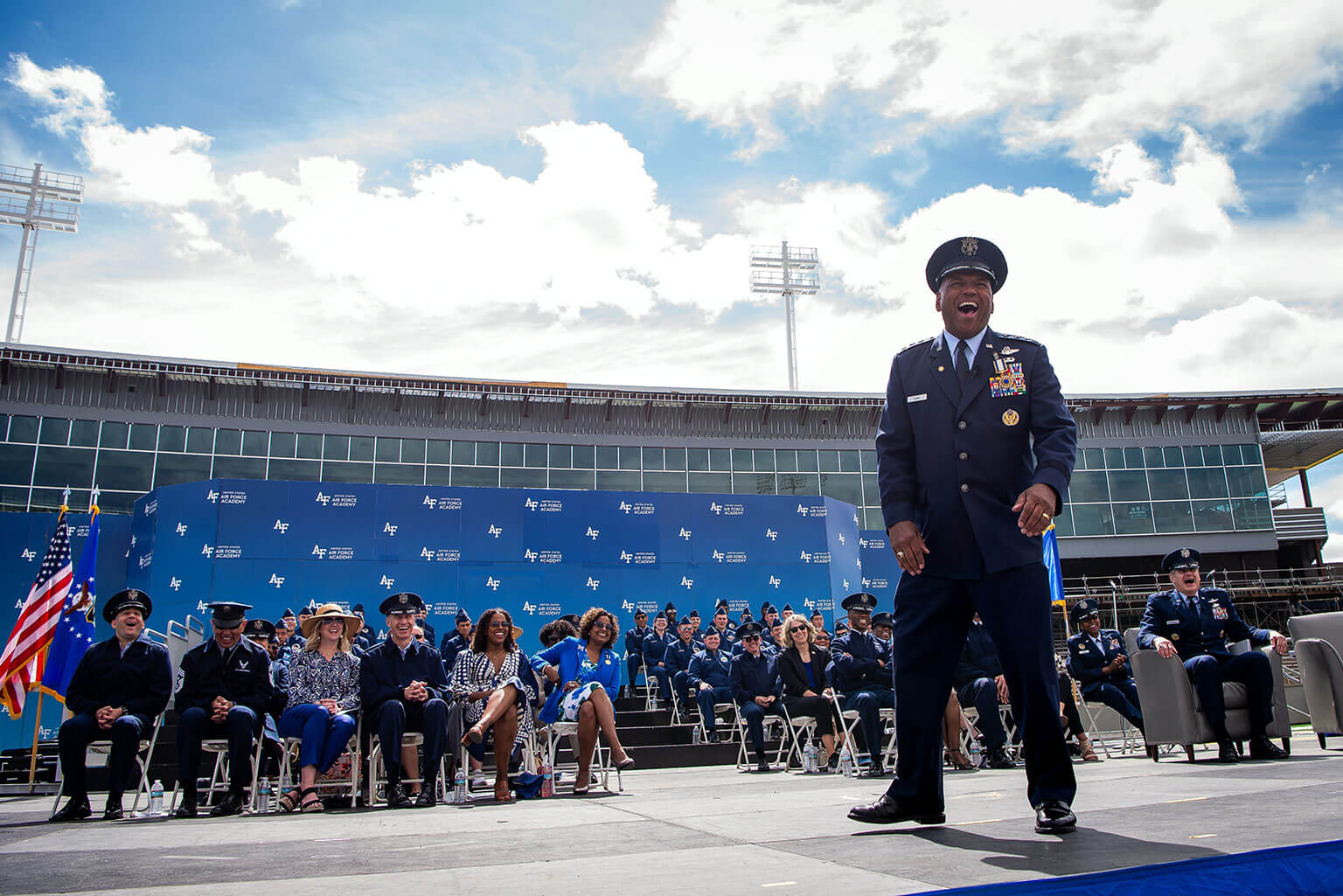
Former U.S Air Force Academy Superintendent Lt. Gen. Richard M. Clark speaks during his retirement ceremony at Falcon Stadium May 31, 2024. (U.S. Air Force photo by Justin Pacheco)
By Katherine Spessa
U.S. Air Force Academy Strategic Communications
U.S. AIR FORCE ACADEMY, Colo. – The retirement of U.S. Air Force Academy Superintendent Lt. Gen. Richard Clark, marking the end of his 38 years of service, was commemorated in a ceremony held at Falcon Stadium here on May 31, 2024.
Family members, peers, former cadets, Airmen and Guardians filled the seats on the floor of the stadium that bookended his career.
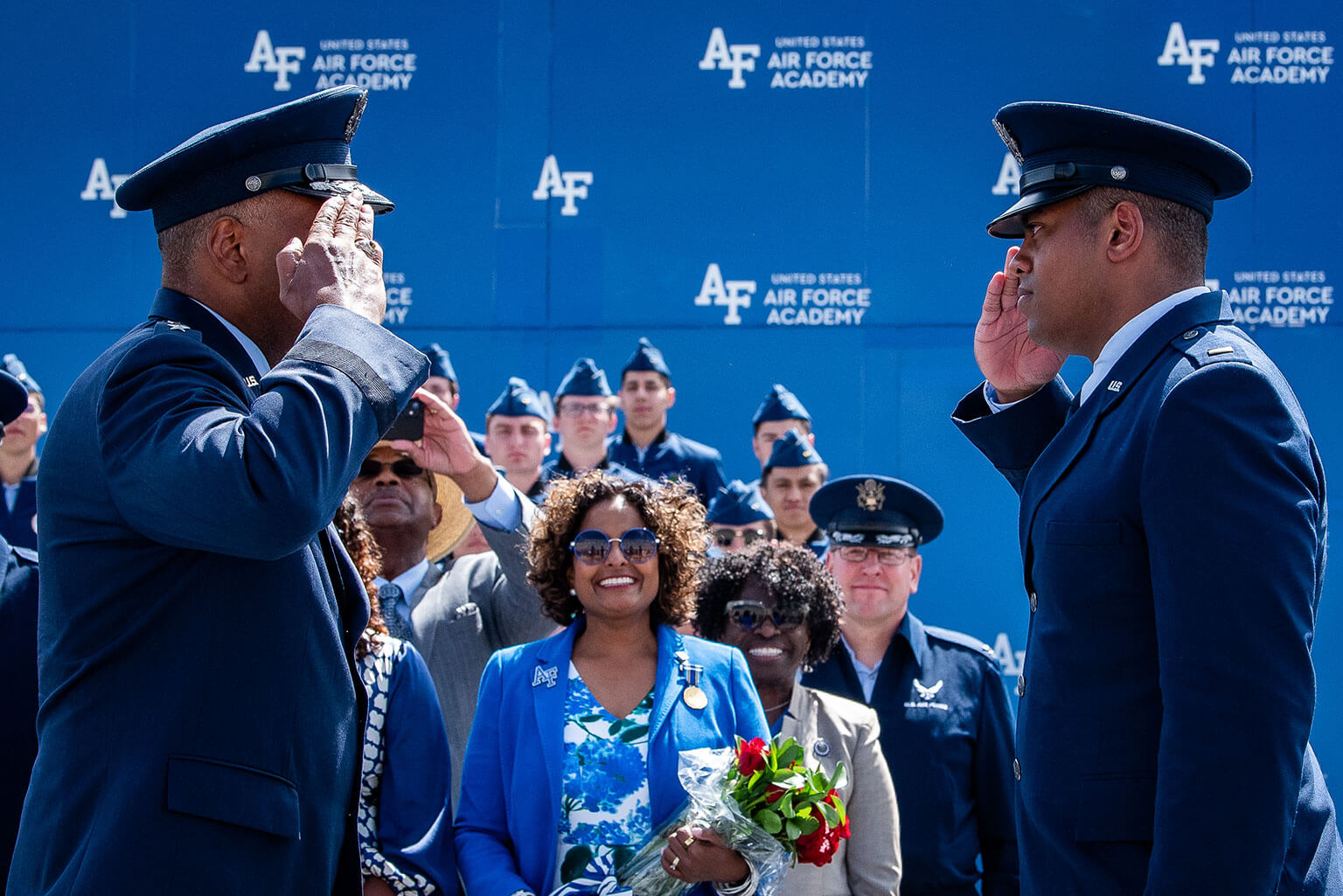
Second Lieutenant Milo Clark (Right) gives his father, Lt. Gen. Richard M. Clark, his final salute at his retirement ceremony at Falcon Stadium May 31, 2024. (U.S. Air Force photo by Justin Pacheco)
A family’s service and sacrifice
Introduced by his son, 2nd Lt. Milo Clark, and officiated by his college roommate, football teammate and “brother,” Lt. Gen. (retired) Bradford J. Shwedo, the retirement ceremony was a family affair. Clark, in his parting words, emphasized the service and sacrifice of his family throughout his career.
“[Milo] and I talked about it, how cool it would be to do something together while we’re both officers, but I never realized what an impact it would have to hear your son read your citation,” Clark said, his voice choked with emotion as he gestured to his newly-commissioned son at the podium, who graduated from Harvard University in May.
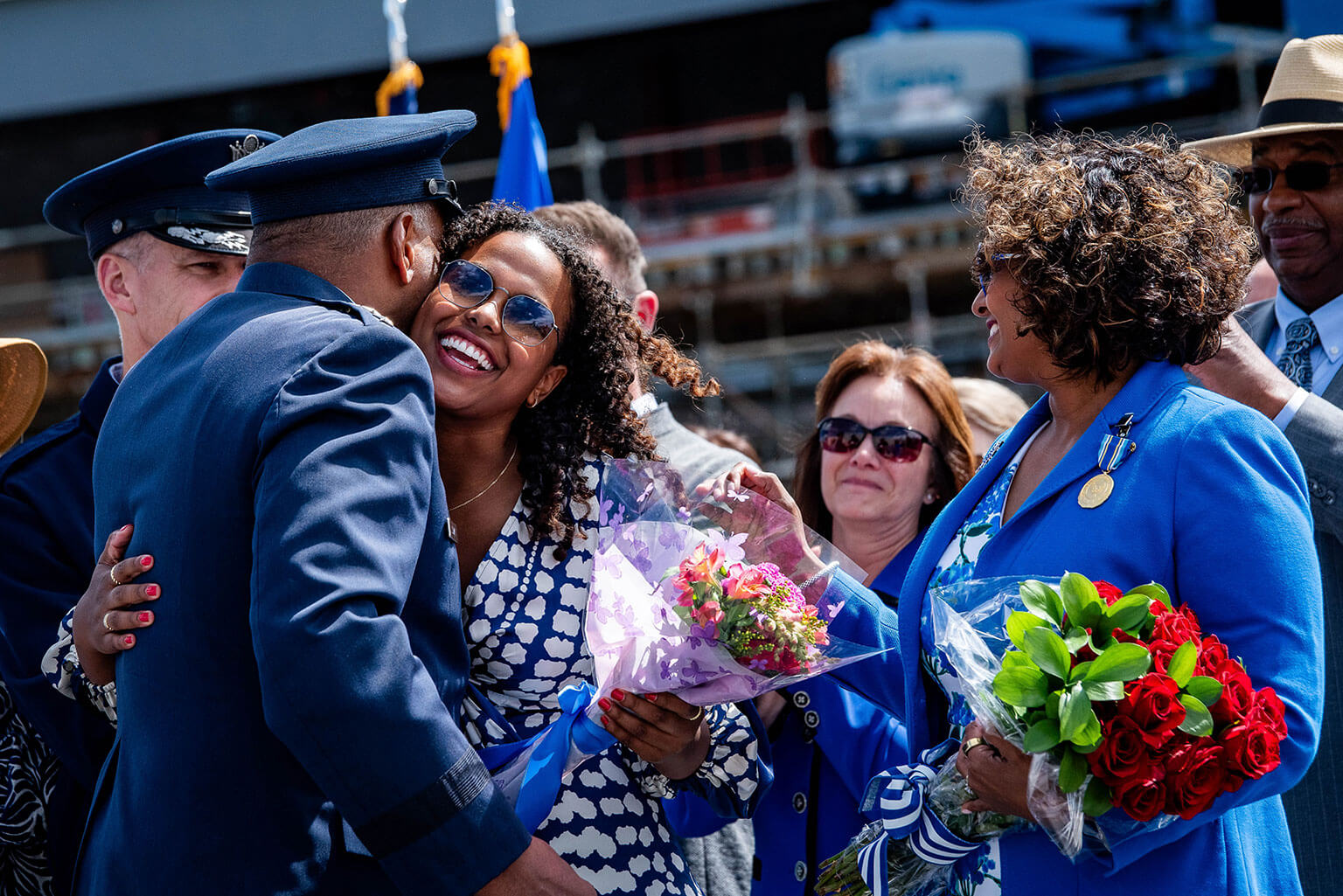
Former U.S Air Force Academy Superintendent Lt. Gen. Richard M. Clark presents flowers to his daughter, Zoe, and wife, Amy, during his retirement ceremony at Falcon Stadium May 31, 2024. (U.S. Air Force photo by Justin Pacheco)
His daughter, Zoe, is also attending Harvard’s ROTC program and will graduate in 2026 to follow in her father’s and brother’s footsteps. Shwedo calls Clark’s influence “infectious excellence.”
Clark, meanwhile, wholly credits his wife, Amy, with their family’s success.
“I can’t tell you how she has enhanced our lives,” said Clark. “When I look at our two kids that have excelled, when I look at my career and the things that I’ve been able to do, I wish I could take credit. She has committed everything that she has into it.”
A full-circle career
Clark began his Air Force career as a cadet and linebacker on one of the Academy’s most successful football teams in the mid-1980s.
His time on the Academy’s football team offered one of several leadership lessons he shared with the audience. In his sophomore year, he suffered a significant injury that his surgeon told him would end his football career. Adamant that this would not be the case, Clark worked hard to get back onto the field, pushing himself too hard and causing further injury.
“I thought about quitting. I was going to leave the Academy at the end of my sophomore year because I didn’t think I was going to be able to play football again.”
He said it was only after he discovered his purpose that he became successful.
“I thought about this Academy, and it gives you the opportunity to serve something bigger than yourself,” Clark said. That realization changed how he viewed his team role and influenced his leadership for the rest of his career. “It became about what I could do for the team, how I could contribute to the greater good, and give it all I’ve got for the greater good.”
During his 38-year career, 42 including his time as a cadet, Clark spent 11 years at the Academy as cadet, football coach, commandant and finally as superintendent.
During his speech, Clark reminisced about his time here, particularly highlighting the honor of leading the nation’s next generation of military officers.
As evidence of his impact during his tenure, a group of cadets stayed behind after graduating or delayed their departure for the summer holiday. They greeted his arrival on stage with a loud and sustained chorus of “Sup,” the affectionate shortening of superintendent used to refer to Clark.
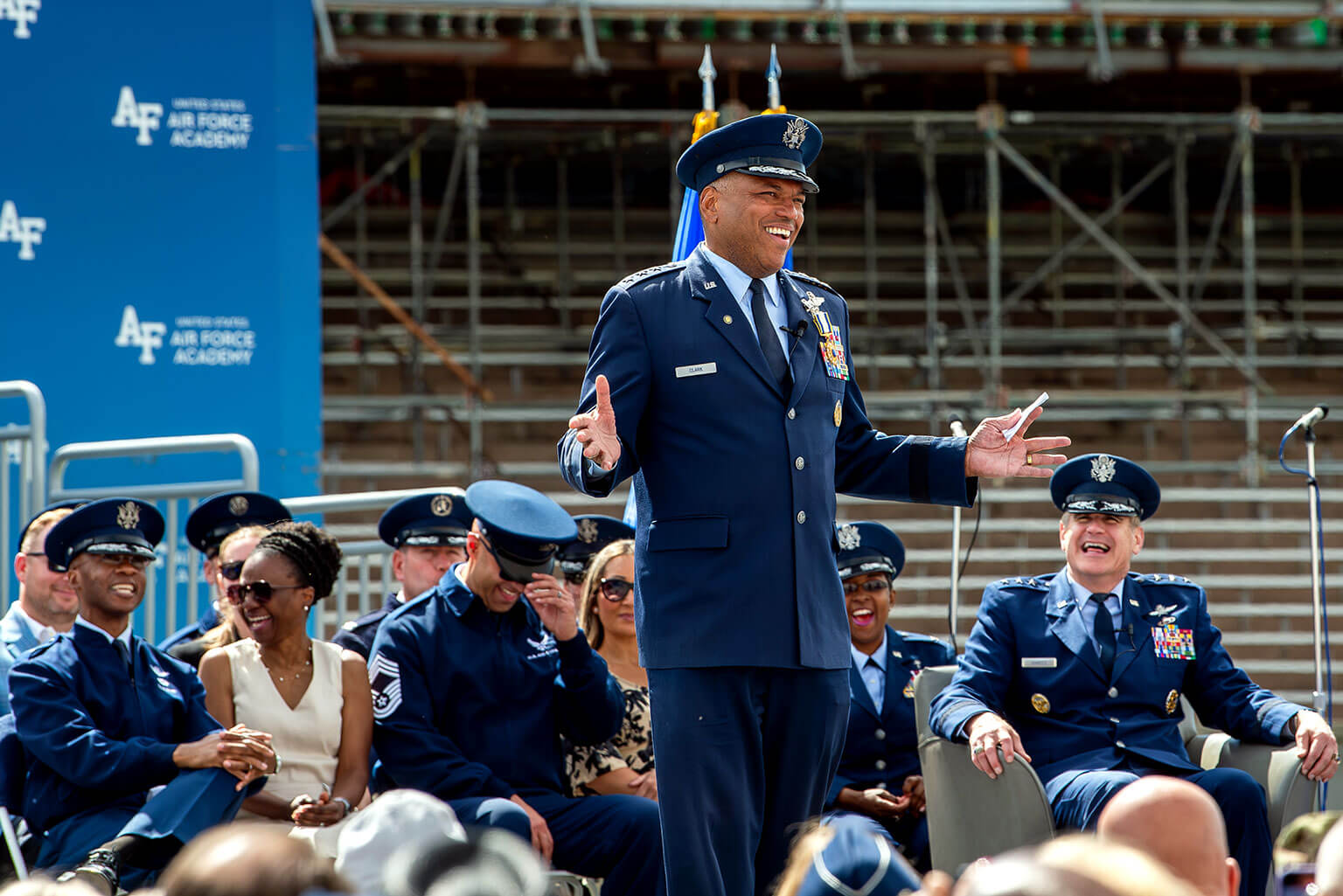
Former U.S Air Force Academy Superintendent Lt. Gen. Richard M. Clark speaks during his retirement ceremony at Falcon Stadium May 31, 2024. (U.S. Air Force photo by Justin Pacheco)
“There is no better way to end my career than to help others forge a path,” said Clark. “These cadets will go out and do incredible things for our country, incredible things for their families, incredible things for everyone else that will serve with them.”
A history-making leader
Between Clark’s periods at the Academy, Clark served as a B-1 Lancer pilot in various roles at all levels of leadership. To mark the occasion of his retirement, two B-1s soared overhead at the conclusion of the National Anthem, opening the ceremony.
Clark is both the first black superintendent of the U.S. Air Force Academy and the first superintendent who also served as commandant. Before being asked to take the role, Clark and Amy had been discussing retirement.
“When she and I talked about this opportunity, we realized I needed to fulfill my purpose, and we had the honor and privilege to do that,” said Clark.
During his latest tenure at the Academy, Clark set out to make changes and succeeded—improving the environment and culture for its cadets, faculty and staff through the Let’s Be Clear Initiative and preparing future officers for the Great Power Competition by establishing the Institute for Future Conflict, among his many actions as superintendent.
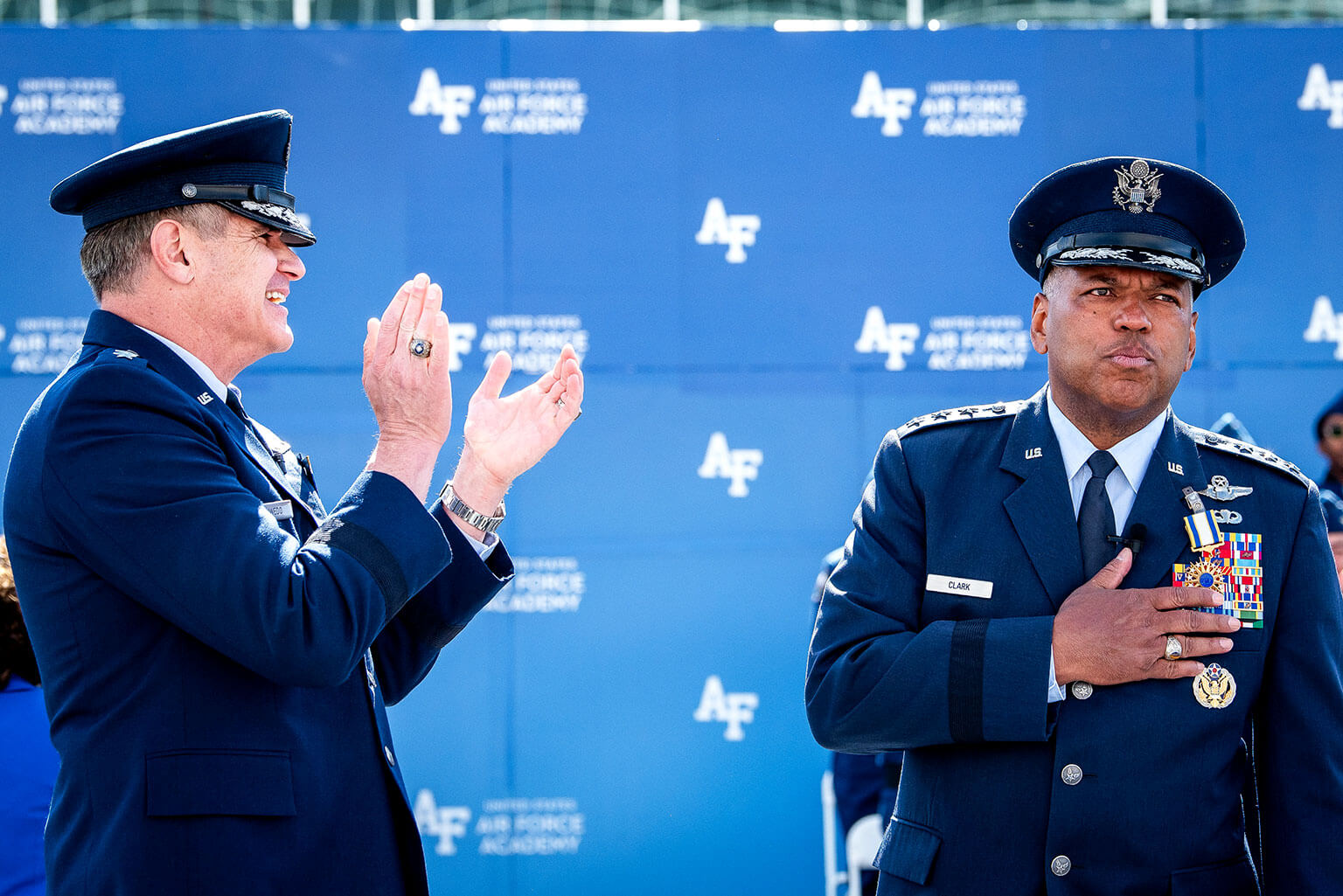
Institute of Future Conflict Director Lt. Gen. (retired) Bradford J. Shwedo applauds former U.S. Air Force Academy Superintendent Lt. Gen. Richard M. Clark during his retirement ceremony at Falcon Stadium May 31, 2024. (U.S. Air Force photo by Justin Pacheco)
According to Shwedo, Clark was equally influential throughout his career, making a mark everywhere he went. During his speech honoring Clark and his career, Shwedo discussed Clark’s role as a White House fellow, a defense attaché in Cairo, his combat missions in Iraq, and his influence on tactics and doctrine. Most of all, he foot-stomped Clark’s role as a leader of Airmen.
“He is the consummate team builder, the consummate mentor,” said Shwedo. “And one of the attributes I most admire in General Clark is his ability to set forth excellence.”
As Clark closes this career and moves on to another as the College Football Playoff director, Clark credits “everything good in my life” to others.
“I have the best people I could ever imagine in my corner, on my side, on my wing,” said Clark. “That’s why I’m standing here now. That’s why I was able to serve in our great Air Force and serve our great country and really fulfill my purpose in life. Thank you for giving me the opportunity.”